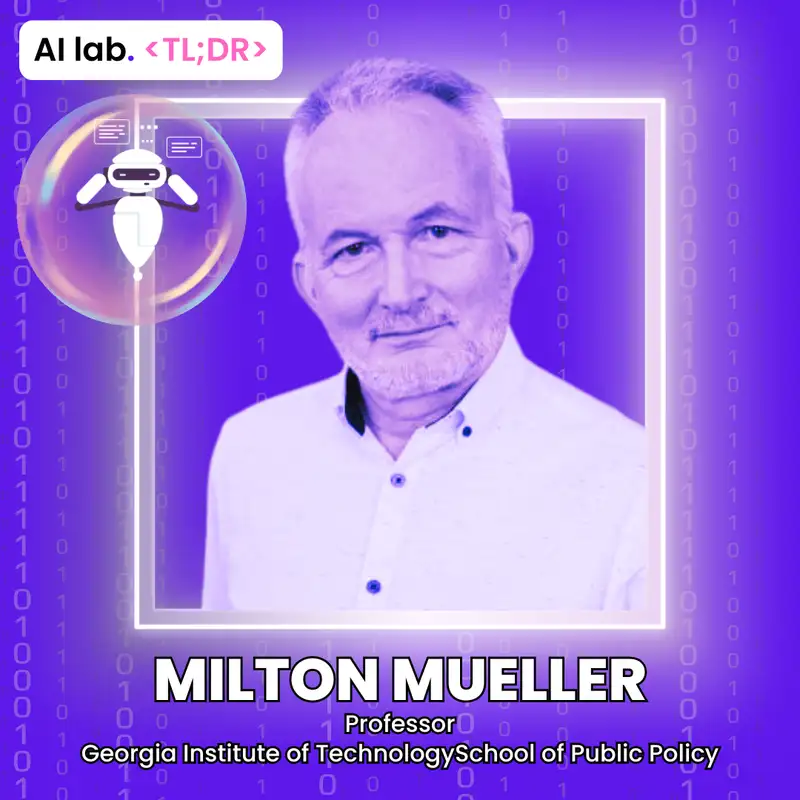AI lab TL;DR | Milton Mueller - Why Regulating AI Misses the Point
🔍 In this TL;DR episode, Milton Mueller (the Georgia Institute of Technology School of Public Policy) argues that what we call “AI” is really just part of a broader digital ecosystem. Instead of vague, top-down AI regulation, he calls for context-specific rules that address actual uses—like facial recognition or medical diagnostics—rather than the underlying technology. The key message: regulate behavior and applications, not “AI” as an abstract concept.
📌 TL;DR Highlights
⏲️[00:00] Intro
⏲️[00:47] Q1-Why do you see AI as “distributed computing,” not a new tech?
⏲️[04:05] Q2-Why aren’t issues like misinformation and bias new to AI?
⏲️[09:29] Q3-Why focus on regulating specific AI apps instead of AI overall?
⏲️[17:02] Wrap-up & Outro
💭 Q1 - Why do you see AI as “distributed computing,” not a new tech?
🗣️ "Distributed computing is a revolutionary technology... it started around 1945, 1950, and it's been progressing and evolving ever since."
🗣️ "What people are calling AI is really a digital ecosystem, which is a cybernetic system that consists of computing devices, networks, data, and software."
🗣️ "When people talk about governing AI, it's not just about AI... you're going to have to control everything about ICT, everything about digital ICT."
🗣️ "If indeed you're talking about some way of controlling in advance the capabilities to do machine learning applications, you really are committing yourself to controlling every element of that digital ecosystem."
💭 Q2 - Why aren’t issues like misinformation and bias new to AI?
🗣️ "People say AI is a problem because of its capability to distribute misinformation, but if you go back to 1995, we were already noticing that some of the things you find on the internet are not true."
🗣️ "In the early days of the internet, people thought that just because something was online, it had to be credible or true."
🗣️ "What was giving you these search results... was an early form of artificial intelligence. You had robots searching the internet and scanning websites according to a program."
🗣️ "What’s interesting is that AI-driven search engines were already giving biased results back in the '90s... search engine bias was something people were complaining about."
🗣️ "You are interacting with an artificial intelligence mechanism that is distributed and globalized, and you're trying to control the results or objecting to the results in ways that are very similar to what we're hearing now about AI."
💭 Q3 - Why focus on regulating specific AI apps instead of AI overall?
🗣️ "The problems posed by a specific AI application would require different kinds of responses depending on the nature of the problem."
🗣️ "Can you solve a problem like that by regulating facial recognition technology? And the answer is no. What you do is you regulate police practice."
🗣️ "You have to be more specific. It's not about regulating AI in a general way; it's about regulating specific applications in their specific context."
🗣️ "Whenever you hear somebody say 'AI is causing this problem,' just substitute the word computing, and you'll see how it makes just as much sense."
🗣️ "The idea that you can regulate technology to prevent it from doing any harm in advance is an idea that, as a historian of technology, just doesn't make any sense."
📌 About Our Guest
🎙️ Milton Mueller | the Georgia Institute of Technology School of Public Policy
🌐 Article | It's just distributed computing: Rethinking AI governance
🌐 Milton Mueller
Milton Mueller is Professor at the Georgia Institute of Technology School of Public Policy. He specialises in the political economy of information and communication and is the author of seven books and numerous journal articles. His work informs not only public policy but also science and technology studies, law, economics, communications, and international studies.
#AI #ArtificialIntelligence #GenerativeAI

